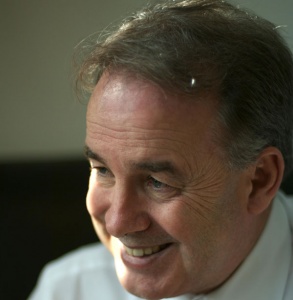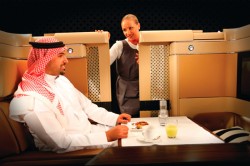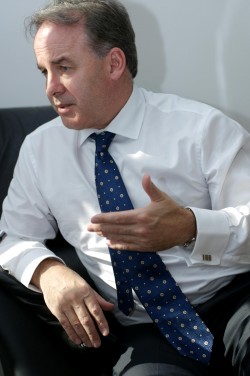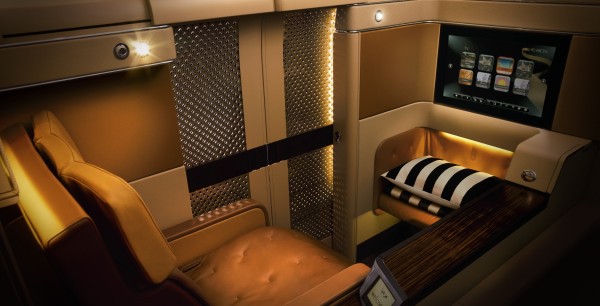Meet the man behind the world’s best airline: James Hogan, Etihad Airways

Etihad Airways is on a roll, having won “World’s Leading Airline” at the World Travel Awards 2009 Grand Final, capping a year in which it has continued to expand its network at a relentless pace. BTN met its chief executive, James Hogan, to find out more about the man behind the world’s leading airline, and what he has planned for 2010.
BTN: In March you said: “The aviation industry is facing its toughest challenge for many years as a result of the current global economic crisis but Etihad Airways will seek to continue its expansion plans during 2009 in a measured, considered and controlled manner.” To what extent do you feel you have achieved that?
JH: Etihad, the fastest growing commercial airline in aviation history, is currently a US$3 billion dollar business. We have nine new aircraft arriving in 2009, which will boost our fleet to 52 and enable us to serve 57 destinations. Etihad has continued with its expansion during 2009 in a measured, considered and controlled manner which means more routes, investment in infrastructure and continued focus on exceptional service delivery.
Our network expansion continued in 2009 with six new routes – Melbourne (March); Astana (May); Istanbul, Athens and Larnaca (June); Chicago and Cape Town (September); and Hyderabad (November). We are constantly reviewing our route network and looking for additional opportunities to expand our services and grow our brand. We now have 18 code share agreements in place and expect more options to become available in the months ahead.
We are continually investing in our product and services – including the launch of our new first class product in May of this year, which will be retrofitted on all aircraft by the end of 2010. We announced the largest engine order in aviation history at this year’s Paris Air Show, and we will continue to grow.
Etihad has set its sights on flying 25 million passengers a year to at least 100 destinations by 2020. We have no intention of sitting still.
ADVERTISEMENT
BTN: Also in March, you stated that you plan to increase passenger numbers by 15 per cent this year to 7m. Are you on target?
JH: The first six months saw the number of passengers carried by Etihad Airways increase by eight per cent to 3.01 million passengers, compared to 2.78 million during the same period in 2008. Load factors continue to hold up well. Across the airline’s network, the airline achieved average load factors of 72 per cent for the first half of the year which, despite the most challenging of conditions, was just a single percentage point below last year.
 We are still on target to carry close to seven million passengers, and achieve a growth of 15 per cent, even in the current economic climate. January to June of this year saw seat factors of 70.5 per cent from London Heathrow to Abu Dhabi and 78 per cent from Manchester to Abu Dhabi.
We are still on target to carry close to seven million passengers, and achieve a growth of 15 per cent, even in the current economic climate. January to June of this year saw seat factors of 70.5 per cent from London Heathrow to Abu Dhabi and 78 per cent from Manchester to Abu Dhabi.
A major reason for our ability to improve loads, even in the current downturn, is the diversity of our customer base. We have large customer segments in many different areas: premium long and short-haul business travellers; leisure travellers going to and from different geographies; very large VFR levels; labour traffic from Asia and the Indian sub-continent into the Gulf; and the regular religious pilgrimage traffic into Saudi Arabia from across the world.
BTN: At this year’s WTM you will be discussing Etihad’s “market place position”. Could you elaborate on this theme?
JH: We are not trying to be the biggest airline in the world but we aim to be the best. We have a very clear commercial mandate and are focused on delivering it. 2009 has been a tough year for everyone in the airline industry but because of Etihad’s investment in its product, fleet and home-base airport, as well as the development in Abu Dhabi, we are confident we can continue our impressive growth.
BTN: And also the airline’s “future strategy” – could you also tell us about these plans?
JH: In 2008 Etihad Airways placed one of the largest aircraft orders in commercial aviation history at the Farnborough Air Show and in June this year we announced the largest engine order in aviation history. Our future strategy includes plans to fly 25 million passengers a year to at least 100 destinations by 2020.
You have just been voted “World’s Leading Airline” at the World Travel Awards. What does it mean to you and the team to win such a prestigious award?
Etihad’s vision is to be the best airline in the world, so to be recognized in this way is very important to us.
We are committed to investing in our product, and pride ourselves on our high levels of customer service.

JH: A downturn is exactly the time when an airline needs to demonstrate its commitment to the very highest standards of service excellence. The economic turbulence that the aviation industry is currently experiencing will give way to better times, and when it does our investment and product innovation will ensure that we are well placed to capitalise on the market.
I believe our new first-class cabin will continue to reaffirm our position as market leader in terms of luxury air travel. The first aircraft with the new first-class cabin entered service in August 2009 and is now available on two of the three daily flights departing Heathrow for Abu Dhabi. The new suite marks the culmination in a series of enhancements in the last 18 months – including the introduction of a new cabin crew position called the food and beverage manager; and the opening of our new lounges at Abu Dhabi, Frankfurt and most recently T4 at Heathrow.
BTN: On which routes do you predict sustained premium demand?
JH: First class performance is currently being driven by greater numbers of passengers travelling on our European, Australian and American routes, with all three now showing strong pick-up and performances that surpass those in Q2 / Q3 this year.
In addition to the current upturn in premium class passengers, Etihad is also seeing the strongest revenue performances in premium class since January / February this year – reflecting both volume upturn and the quality of revenue.
BTN: The premium economy cabin is becoming increasingly popular on airlines. Do you have any plans to launch a premium economy cabin?
JH: We do not need a premium economy cabin because I believe our standard economy product is already that good. However, we are planning upgrades to our business and economy class cabins with improvements to the seats and on-demand in-flight entertainment systems. We do not seek to be like US and European airline businesses – our segmentation is different and this in turn strengthens our business model.
BTN: What routes are you planning on launching in 2010?
JH: In early 2010 we will launch flights to Sri Lanka and Japan, with further announcements to be made in the coming months.
We are constantly reviewing our route network looking for opportunities to expand our services and grow our brand. By the end of 2009 we will operate to 57 destinations.

(Above: Etihad is in a class of its own)
BTN: Are there any plans to open more premium lounges in the world?
JH: In 2009 Etihad opened two dedicated premium lounges outside of the UAE, in Frankfurt, Germany and Heathrow Terminal 4. The new lounges are a significant milestone in Etihad’s development and a step forward in the airline’s commitment to deliver products and services of the highest possible standards. The lounges offer five star dining, a range of entertainment options and a Six Senses Spa. These two lounges will be followed by others in international markets in the near future.
BTN: The airline sponsors Abu Dhabi F1? Are there any more sponsorship plans in the pipeline?
JH: Sports sponsorship is a major part of Eithad’s marketing and brand-building strategy. In 2009 the airline announced a three year shirt sponsorship deal with Manchester City, which joins our other major sponsorship deals – the Ferrari Formula 1 team, All Ireland Hurling Championships, the Formula 1 Abu Dhabi Grand Prix, Chelsea Football Club, Harlequins Rugby Club and the Abu Dhabi Golf Championships. In March the Telstra Dome in Melbourne was also re-named the Etihad Stadium.
Well placed sponsorships in key markets can significantly increase brand awareness for a young organisation such as ours. Prominent sports amass a substantial following with unprecedented loyalty. Although the airline is predominantly involved in sport sponsorships, we do not discount any sponsorship that would provide a tangible benefit to our international marketing mix and we continue to consider new opportunities where appropriate.
For more information visit www.etihadairways.com

